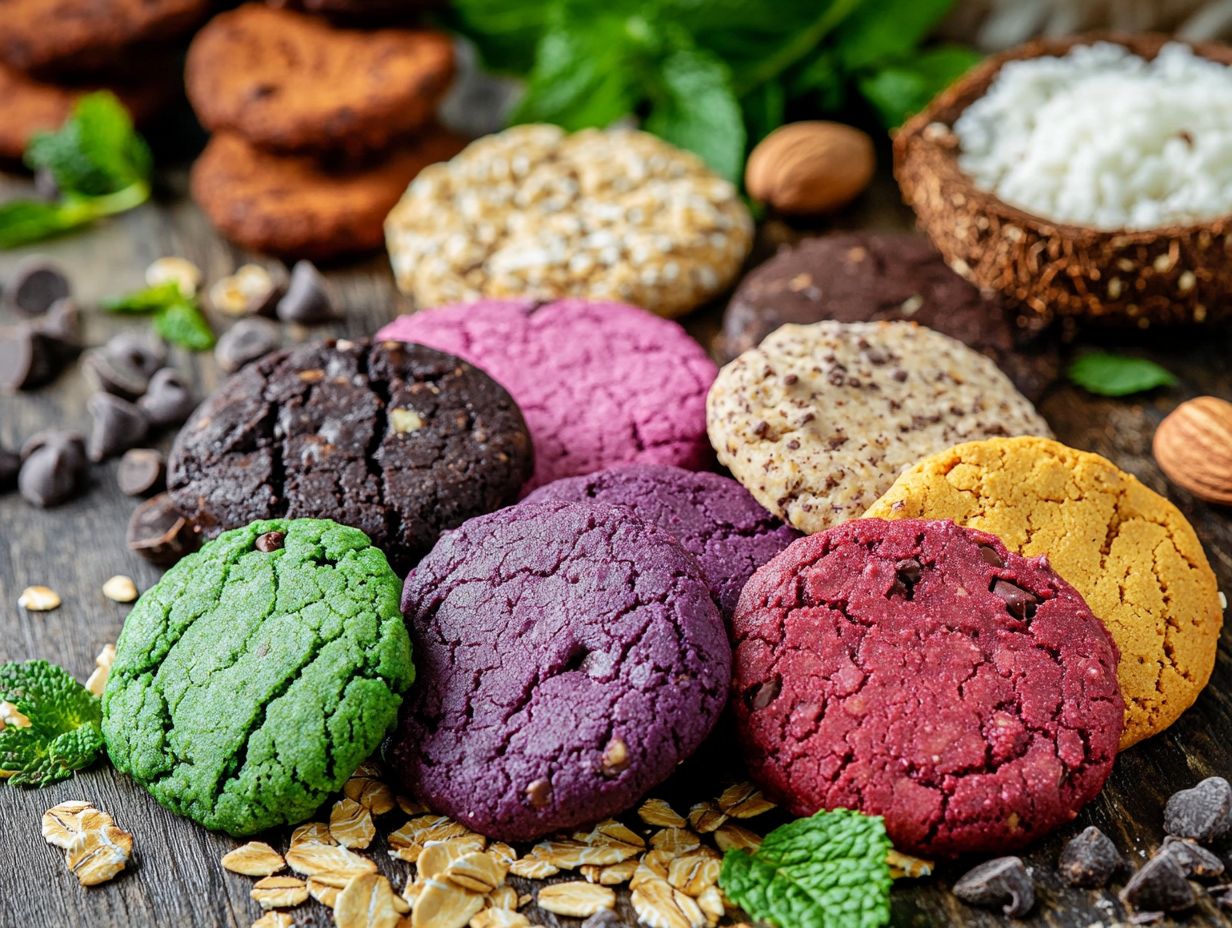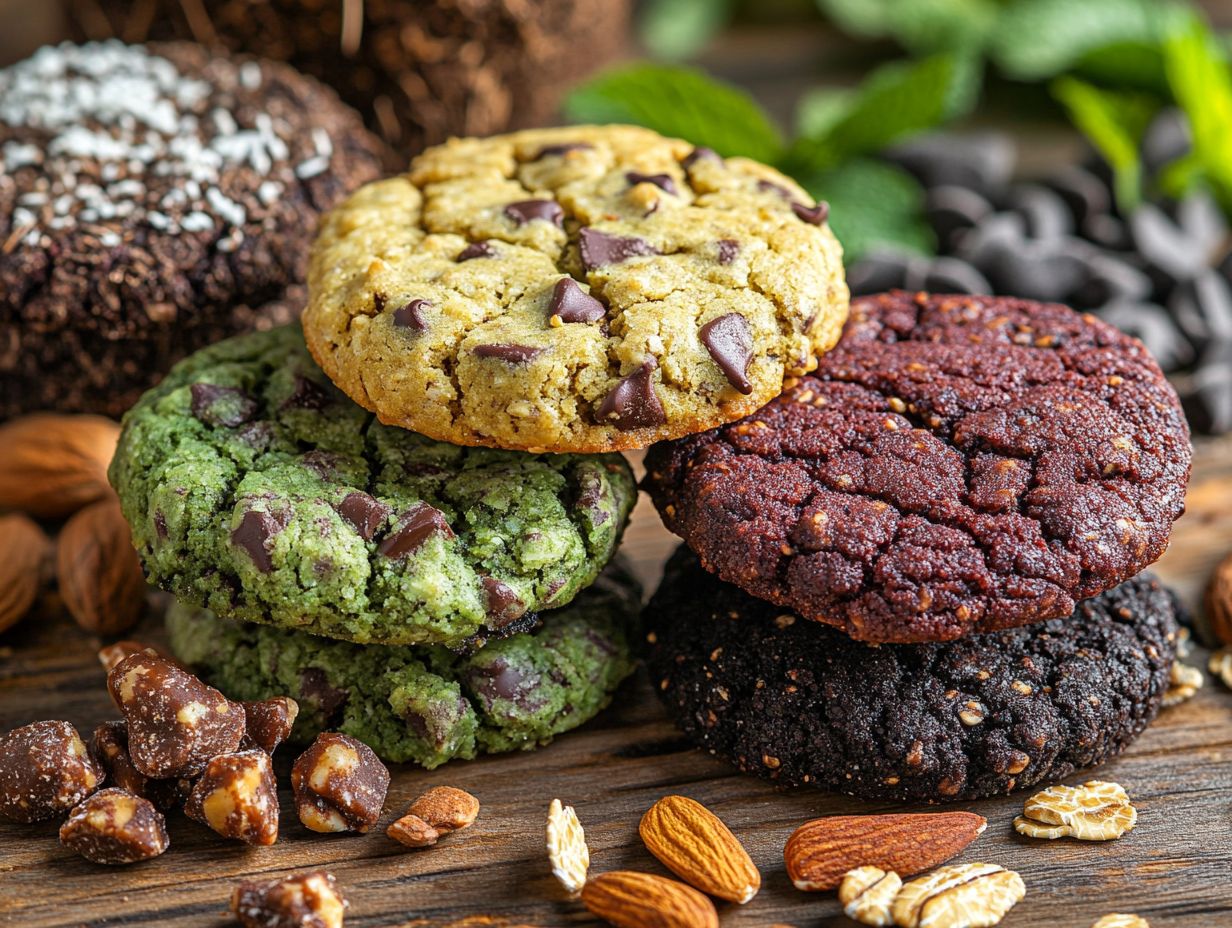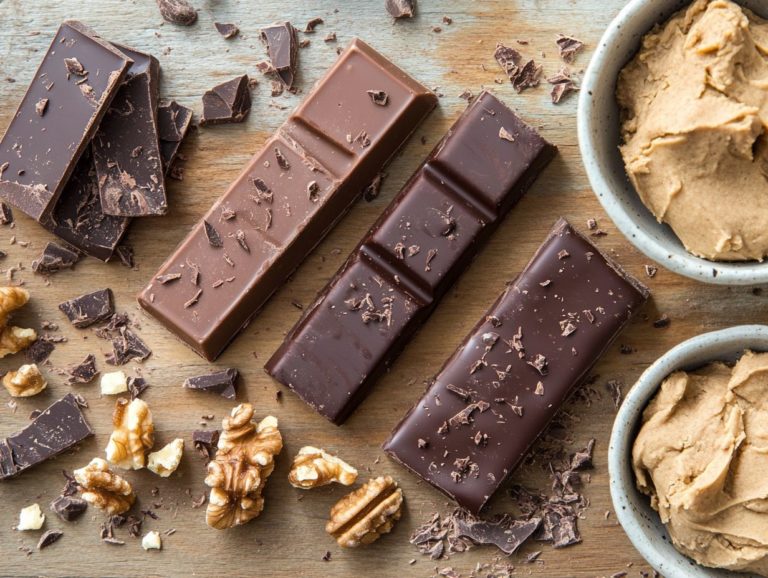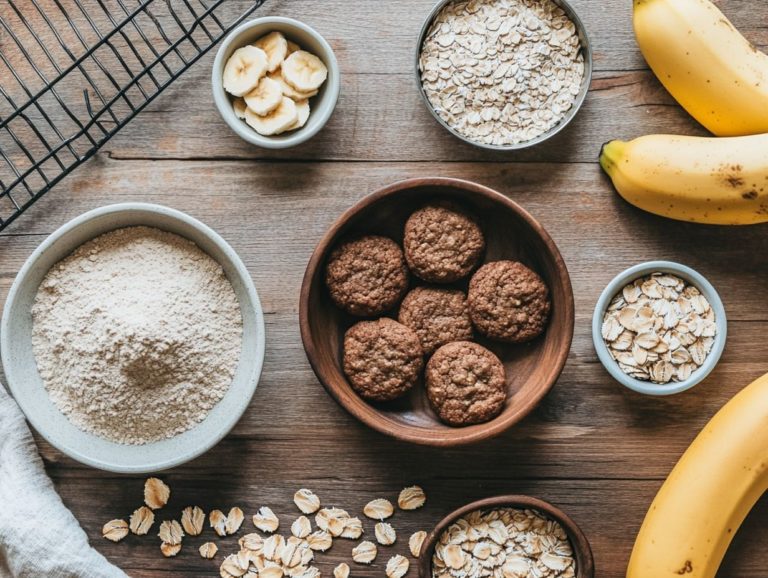The Evolution of Plant-Based Cookie Recipes
As you embrace a healthier lifestyle, you’ll notice the rise of plant-based diets. They inspire health consciousness and a commitment to environmental sustainability.
This shift is not just a trend; it’s reshaping daily meals and transforming traditional treats. Indulgent cookies and chocolate desserts are evolving.
Delve into the essence of plant-based diets and discover how cookie recipes, including Chocolate Chunk Vegan Pantry Cookies, have evolved to reflect these changes. All while reaping the numerous benefits of indulging in plant-based cookies.
Whether you re a seasoned baker or a curious novice, you ll find valuable tips, innovative recipes, and insights that will inspire you on a delicious journey into the world of vegan baking. This includes delightful vegan treats and cookie recipes that cater to cookie lovers everywhere.
Contents
- Benefits of Plant-Based Cookies
- Health Benefits
- Environmental Sustainability and Benefits
- Animal Welfare Benefits
- How to Make Your Own Plant-Based Cookies: Vegan Pantry and Beyond
- Frequently Asked Questions
- 1. How have plant-based cookie recipes evolved over time, from everything cookie to modern favorites?
- 2. Why have plant-based cookies gained popularity in recent years among cookie lovers?
- 3. How do plant-based cookie recipes compare to traditional cookie recipes in terms of taste, texture, and chewiness?
Key Takeaways:

- Plant-based diets are gaining popularity due to health, environmental, and animal welfare concerns, including the rise of vegan chocolate and other pantry cookies.
- Traditional cookie recipes can be easily adapted to be plant-based by substituting traditional ingredients with plant-based alternatives, like using flax eggs (ground flaxseed mixed with water) and vegan butter.
- Plant-based cookies offer numerous benefits, including improved health, reduced environmental impact, support for animal welfare, and the inclusion of nutritious ingredients.
The Rise of Plant-Based Diets
The rise of plant-based diets is reshaping the cooking scene, as more individuals like you embrace a vegan lifestyle that prioritizes health and environmental sustainability. This shift toward plant-based eating signifies a significant transformation in your perception of food, nutrition, and the future of our planet.
With a wealth of nutritious ingredients and innovative recipes at your fingertips, your enthusiasm for plant-based foods inspires a new wave of cooking and baking. You’re encouraged to explore healthier options and delightful flavors that satisfy your palate while contributing to a more sustainable lifestyle with the help of a well-stocked vegan pantry.
What is a Plant-Based Diet?
A plant-based diet primarily centers on foods derived from plants, encompassing an array of fruits, vegetables, whole grains, legumes, nuts, and seeds, while minimizing or excluding animal products.
This approach invites you to embrace a diverse range of nutritious and wholesome ingredients that enhance your overall health and well-being. For instance, vibrant fruits and nutrient-dense vegetables form the cornerstone of many meals. Whole grains like quinoa and brown rice deliver essential energy. Legumes such as beans and lentils provide a robust source of protein while introducing a wealth of vitamins and minerals to your plate. Nuts and seeds add healthy fats, promoting heart health and keeping you feeling satisfied.
As you adopt this lifestyle, you ll likely find yourself venturing into the world of innovative vegan options. Discover delightful alternatives like plant-based milks, tofu, and tempeh. This exploration allows you to engage in creative culinary experiences without sacrificing taste or nutrition, including experimenting with vegan chocolate and other delectable vegan recipes.
Why are Plant-Based Diets Gaining Popularity?
Plant-based diets are gaining traction, and for good reason. You can enjoy a host of health benefits, such as better heart health, effective weight management, and increased energy levels, all while significantly reducing your environmental impact.
As you become more aware of how your food choices affect the planet, the allure of nourishing both your body and the environment becomes undeniable. The link between plant-based eating and a lower carbon footprint resonates with those who are passionate about combating climate change. Ethical considerations regarding animal welfare play an increasingly pivotal role in shaping dietary preferences, prompting many to select options that align with their values.
Adopting this holistic approach enhances your personal health and cultivates a deeper sense of responsibility toward sustainable living and animal rights. This creates a powerful argument for shifting toward a plant-based lifestyle that benefits you and the world around you.
The popularity of plant-based cookies is on the rise, reflecting a growing interest in healthier dessert options without sacrificing flavor. This article explores the science behind baking plant-based cookies, showcasing how traditional favorites can be adapted to meet modern dietary preferences.
The Evolution of Plant-Based Cookie Recipes
The evolution of plant-based cookie recipes represents a remarkable transformation in the art of dessert-making, where innovative twists on classic recipes offer delightful vegan treats for cookie enthusiasts around the globe, including everything cookie lovers who crave unique flavors.
From classic chocolate chunk cookies to a variety of options made with nutritious ingredients, this change in baking trends highlights a rising demand for indulgent yet wholesome alternatives. As more bakers embrace vegan techniques, the creativity and diversity within the realm of plant-based cookies flourish, allowing you to savor delicious cookies without compromising your health or values.
Traditional Cookie Recipes

Traditional cookie recipes often draw upon all-purpose flour, sugar, and eggs to craft classic delights like chocolate chunk cookies, reflecting the rich tapestry of American baking history. These recipes are a staple in the pantry of any cookie enthusiast.
To achieve that impeccable texture you crave, you ll typically want to employ techniques such as creaming butter with sugar. This method incorporates air into the mixture, resulting in a light and tender crumb that melts in your mouth.
The addition of chocolate chunks not only amplifies the sweetness but also introduces a luxurious, velvety mouthfeel that elevates each delectable bite. Using high-quality vegan chocolate chunks can enhance the overall experience.
Chilling the dough is another method you ll want to consider; it allows for deeper flavor development while controlling the spread during baking. This ensures that your cookies come out of the oven perfectly chewy on the inside, with just the right amount of crispness on the edges.
These cherished techniques are what make traditional cookie recipes beloved treasures passed down through generations of cookie lovers.
Adapting Traditional Recipes to Plant-Based Cookies
Adapting traditional cookie recipes to plant-based alternatives requires some clever substitutions, such as using vegan butter and flaxseed mixed with water to replace eggs, ensuring that both flavor and texture remain utterly delightful. These egg replacements help maintain the chewy texture that cookie lovers cherish.
Incorporating ingredients like coconut oil and almond milk allows you to achieve a rich, moist consistency that rivals even the most cherished conventional recipes. Replacing refined sugars with natural sweeteners, like maple syrup or coconut sugar, not only elevates the cookies’ taste but also introduces a depth of flavor that often surprises those who take a bite.
Utilizing healthy fats like almond butter can further enhance the texture and flavor. If you’re looking to enhance the nutrition factor, consider incorporating whole grain flours or adding oats for a heartier texture and more satisfying chew.
With these thoughtful modifications, you can create delectable treats that honor dietary preferences while still preserving the beloved qualities of classic cookies. Including flaxseed meal and omega fatty acids can also boost the nutritional profile of your cookies.
Innovative Plant-Based Cookie Recipes
Get ready to explore innovative plant-based cookie recipes that are transforming the dessert landscape, showcasing creative flavors and combinations that will undoubtedly tantalize your taste buds. Think of everything cookies bursting with dried fruit and nut butters, which can be easily customized to suit your taste preferences.
These delightful treats present endless possibilities, such as chocolate avocado cookies that deliver a creamy texture while providing heart-healthy fats, or snickerdoodles made with almond flour for that delightful nutty twist.
Picture cookies infused with matcha for an energizing boost, or a spicy chai version that harmoniously blends warming spices with a chewy base. You might also explore adding walnut pieces or currants for additional texture and flavor.
By incorporating nutrient-dense ingredients like flaxseeds, chia seeds, and spirulina, you can elevate the health benefits of these cookies, making them not just indulgent but also rich in essential vitamins and minerals.
The beauty of vegan baking lies in this remarkable adaptability, allowing you to explore exquisite flavor combinations without sacrificing nutrition. Following baking tips and using high-quality baking sheets can further ensure the best results.
Try these plant-based cookie recipes today and share your favorites with us!
Benefits of Plant-Based Cookies
The benefits of plant-based cookies go well beyond their delightful flavor. They offer substantial health, environmental, and ethical advantages, making them an enticing option for both mindful eaters and cookie enthusiasts. These cookies are often featured in recipe cards from popular vegan bakeries like Sticky Fingers Bakery and Sweet Vegan Cookie Co.
Embrace these treats to indulge in something sweet while aligning with values that promote well-being and sustainability.
Health Benefits
The health benefits of plant-based cookies are truly significant. They often feature healthy fats, whole food ingredients, and reduced cholesterol. This makes them great for those who care about their health. Common ingredients like agave syrup and flaxseed meal contribute to these benefits.
These delightful treats typically incorporate ingredients like oats, almond flour, and agave syrup, which elevate the flavor profile and boost their nutritional value significantly. By choosing almond flour, you gain access to a rich source of vitamin E and healthy monounsaturated fats, promoting heart health in the process.
Including ingredients like coconut sugar can further enhance their health benefits. Plant-based cookies often include natural sweeteners and fiber-rich components, which facilitate improved digestion and help maintain steady energy levels. Experimenting with vegan pantry staples can provide a variety of flavors and textures.
The absence of animal products aligns seamlessly with vegetarian and vegan dietary preferences, underscoring the versatility and healthfulness of these cookies. Incorporate plant-based cookies into your balanced diet today for a delicious and healthy treat!
Environmental Sustainability and Benefits

Plant-based cookies offer a delightful way to embrace environmental benefits by promoting sustainable choices that effectively reduce your carbon footprint and resource consumption. This perfectly aligns with a greener lifestyle and health consciousness.
When you opt for cookies made from wholesome ingredients like oats, nuts, and alternative flours, you’re not just indulging in delicious treats; you’re also supporting farming practices that typically require fewer resources than traditional animal agriculture. These cookies encourage you to cultivate a climate-friendly eating pattern, nudging you toward a vegan lifestyle that helps minimize deforestation and greenhouse gas emissions.
The collective impact of reducing dairy and meat consumption can lead to significant changes in land use and biodiversity conservation. This ultimately fosters a healthier planet for future generations. Even your smallest daily choices can play a crucial role in contributing to a more sustainable and eco-conscious world. This reflects the principles of vegan recipes that promote environmental sustainability.
Animal Welfare Benefits
Indulge your sweet tooth with plant-based cookies that satisfy cravings while being good for you! These vegan treats address health and environmental concerns while championing animal welfare by steering clear of animal-derived ingredients in baking. They symbolize a commitment to a compassionate world and ethical considerations.
This shift in baking practices signals a growing awareness of the ethical implications tied to your food choices. By selecting ingredients that are free from animal involvement, you make a conscious decision that aligns with humane treatment standards. The dairy and egg industries often raise significant animal welfare issues, which is why plant-based alternatives like vegan butter and flax eggs present such an enticing option.
These cookies invite you to connect with broader ethical considerations. They encourage you to reflect on your lifestyle choices and their impact on all living beings, making every bite a step towards a more compassionate world filled with vegan baking and nutrient-dense ingredients.
Try making your own plant-based cookies today and share your experiences with friends and family for a more inclusive, delicious future!
How to Make Your Own Plant-Based Cookies: Vegan Pantry and Beyond
Making your own plant-based cookies is a fun and exciting adventure! You have the freedom to customize these treats with your favorite flavors and ingredients, whether it s indulgent chocolate chunks, crunchy peanut or almond butter, or flavorful dried fruits. Utilizing a recipe card can help you keep track of these cookie recipes for quick reference.
The possibilities are endless. Each batch becomes a unique expression of your taste, embodying scrumptious chocolate and easily customizable options.
Substituting Traditional Ingredients with Plant-Based Alternatives
Substituting traditional ingredients with plant-based alternatives is essential for creating delicious vegan cookies. Imagine swapping refined sugar for coconut sugar or using peanut or almond butter instead of dairy butter.
These thoughtful substitutions elevate the flavor profile of your cookies. They also transform them into a more nutritious treat. Coconut sugar, for instance, introduces a rich, caramel-like sweetness that beautifully complements chocolate or nut flavors. Nut butters lend a creamy texture and healthy fats to the mix.
Consider alternatives like aquafaba the liquid from canned chickpeas as a brilliant egg replacement. It ensures moisture retention and binding without any animal products. Likewise, flaxseed meal or chia seeds combined with water can fulfill this role while providing a boost of omega-3 fatty acids and reducing cholesterol.
Each of these adaptations caters to various dietary preferences. Enjoy the journey of crafting these delightful vegan cookies and cookie experiments by exploring international plant-based cookie recipes without compromise!
Vegan Baking Tips for Plant-Based Cookies
To achieve the perfect chewy cookies, several baking tips can truly elevate your creations. From ensuring precise measurements to understanding potential baking flaws that might arise along the way, these tips are essential.
When you re gearing up to bake plant-based cookies, it s vital to use the right proportions of ingredients like flour, sweeteners, and fats. Any variations can dramatically affect the texture. If you decide to swap oils or butters for plant-based alternatives, like using vegan butter or almond butter, you may need to tweak the liquid content to keep that all-important moisture intact.
The type of flour you choose also plays a crucial role. Opting for whole wheat flour can yield denser cookies, whereas all-purpose flour will give you that lighter, airy bite.
Employing techniques such as chilling the dough before baking and underbaking just slightly can enhance the ultimate chewiness. These methods help you steer clear of the dreaded dryness that comes from overbaking. Using the right baking sheets and maintaining cookie dough safety can also contribute significantly to the final result.
By understanding these nuances, you ll enjoy a delightful baking experience while producing cookies that everyone will adore!
Frequently Asked Questions

The evolution of plant-based cookie recipes can be traced back to ancient civilizations, where plant-based ingredients such as honey and fruits were used to make sweet treats. Over time, the use of plant-based ingredients in cookies has evolved to include a wider variety of options, incorporating ingredients such as nuts, seeds, and alternative flours. Today, cookies have diversified to include indulgent cookies with healthy ingredients.
With an increasing awareness of the benefits of a plant-based diet, more people are turning to plant-based cookie recipes as a healthier alternative to traditional cookies. Plant-based cookies are often lower in calories, fat, and sugar, making them a guilt-free indulgence. The growing interest in vegan chocolate and other chocolate desserts has also contributed to their popularity.
Thanks to advancements in plant-based cooking techniques and ingredients, plant-based cookies can now rival traditional cookies in taste and texture. They can be just as soft, chewy, and decadent as their non-plant-based counterparts.
The use of vegan chocolate chunks and flaxseed meal (ground flaxseeds used as an egg substitute) has enhanced their appeal.
4. Are there any challenges in baking plant-based cookies, like vegan chocolate desserts?
One challenge in baking plant-based cookies is finding the right balance of ingredients to achieve the desired texture and flavor. Alternative ingredients may require some experimentation and adjustments to traditional recipes.
With the right knowledge and techniques, you can easily make delicious plant-based cookies. Utilizing baking powder and baking soda accurately can help overcome these challenges.
5. Can plant-based cookies cater to dietary restrictions, including those found in the vegan pantry?
Yes, plant-based cookies can cater to a variety of dietary restrictions, such as vegan, gluten-free, and nut-free. Alternative ingredients can replace animal products, wheat flour, and nuts.
This makes plant-based cookies a versatile and inclusive option for those with dietary restrictions. Visiting an organic market can provide the necessary nutrient-dense ingredients.
6. What are some creative plant-based ingredients that can be used in cookie recipes, especially for vegan treats?
You won’t believe the endless possibilities for plant-based cookie ingredients! Some creative options include using chickpea flour, sweet potatoes, avocado, or even black beans.
These ingredients not only add unique flavors and textures but also provide added nutrients to your cookies. Try incorporating walnut pieces or dried fruit to make flavorful cookies that wow your taste buds!
Try these ingredients today to make cookies that wow your taste buds!






